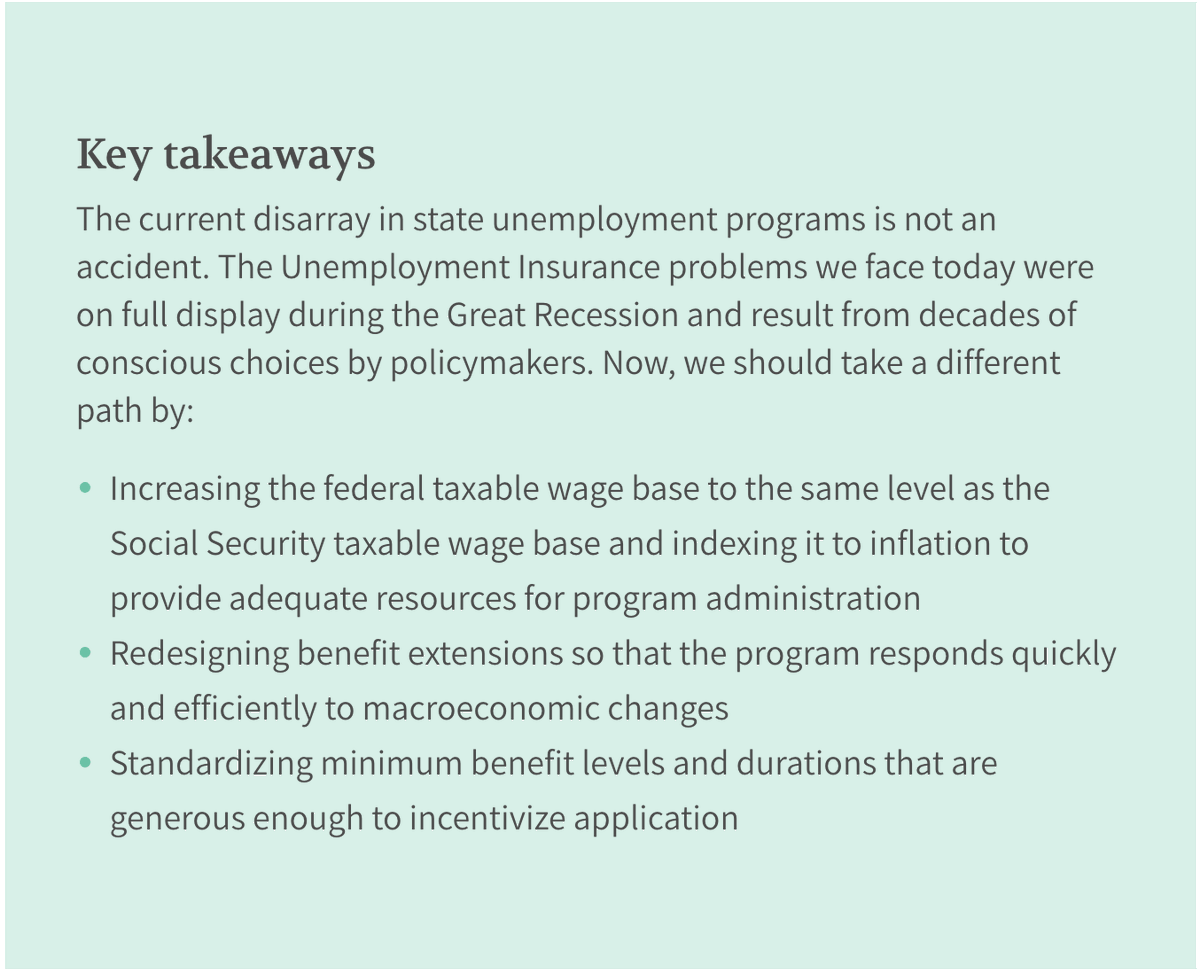
Starting NOW 🚨 We're live at the @fordschool virtual Unemployment Insurance symposium, where @alixgouldwerth is going to be talking UI financing this morning.
https://twitter.com/equitablegrowth/status/1537180845038895105
We've got a three part-presentation from @alixgouldwerth today:
✅ The problems with UI
✅ Approaches to addressing these problems
✅ Unexpected ways that financing shapes program participant experience
✅ The problems with UI
✅ Approaches to addressing these problems
✅ Unexpected ways that financing shapes program participant experience
@alixgouldwerth So starting with the problems: @alixgouldwerth tells us UI has two major functions—(1) to stabilize the macroeconomy in moments of economic crisis, and (2) to provide partial income replacement to workers who lose jobs through no fault of their own.
@alixgouldwerth But UI can’t fill either function if workers who lose jobs through no fault of their own don’t receive it.
As the chart below shows, in 2014 <1 in 4 unemployed workers received UI. And despite a big recipiency rate spike during the pandemic, today we're back to rates in the 20s.
As the chart below shows, in 2014 <1 in 4 unemployed workers received UI. And despite a big recipiency rate spike during the pandemic, today we're back to rates in the 20s.

@alixgouldwerth That's not the only issue: @alixgouldwerth stresses that while workers who are members of disadvantaged demographic groups are the MOST likely to need UI to smooth their consumption, they are the LEAST likely to apply for and to access these benefits. 

@alixgouldwerth One obvious solution to #FixUI is then to make eligibility criteria more inclusive. @alixgouldwerth adds that other obvious solutions are to incentivize states to:
🔵 maintain higher benefit levels
🔵 maintain 26 weeks of benefits
🔵 improve benefit access
🔵 maintain higher benefit levels
🔵 maintain 26 weeks of benefits
🔵 improve benefit access
@alixgouldwerth But then you end up stuck in a cycle—so @alixgouldwerth says we have to look at the root cause of these problems.
If states don’t have 💵 to pay for benefits, the amount of UI dollars that flows to stabilize the macroeconomy and workers’ bank accounts will remain constant & low.
If states don’t have 💵 to pay for benefits, the amount of UI dollars that flows to stabilize the macroeconomy and workers’ bank accounts will remain constant & low.

@alixgouldwerth Over time, the amount of money that flows into the UI system has decreased as the tax base has eroded, meaning that we are collecting taxes on a smaller and smaller pool of earnings. equitablegrowth.org/labor-organiza… (cc: @awh) 

@alixgouldwerth To solve UI problems, we need to address program financing.
Not only does financing underpin the access problems in the UI system, it also shapes employers and workers interactions with the system in unexpected ways, states @alixgouldwerth at this morning's @fordschool panel.
Not only does financing underpin the access problems in the UI system, it also shapes employers and workers interactions with the system in unexpected ways, states @alixgouldwerth at this morning's @fordschool panel.
@alixgouldwerth Why is that? The tax rate paid by employers is variable, so if more of your former workers claim UI, you pay a higher rate.
This is known as experience rating—it provides employers with an incentive not to lay off workers, but it also incentivizes employers to stop UI claims.
This is known as experience rating—it provides employers with an incentive not to lay off workers, but it also incentivizes employers to stop UI claims.
@alixgouldwerth And now @alixgouldwerth is walking us through a few examples that demonstrate how the employer involvement in claims management means that some workers walk away from claims—whether their relationships with their employers are good or bad.
@alixgouldwerth This whole @fordschool symposium is centered on solutions to the problems that plague UI. But as @alixgouldwerth has emphasized this morning, *none* of them will work without solving the financing problem
@alixgouldwerth And @alixgouldwerth closes out her opening remarks on this note: "By addressing financing problems to #FixUI, we can help millions of workers who lose jobs through no fault of their own and help stabilize the macroeconomy when crisis hits."
@alixgouldwerth Today's first @fordschool panel is wrapping up, but if you're interested in learning more about UI financing, check out Section 2 of our joint report with @EconomicPolicy, @amprog, @popdemoc, @Groundwork, @NelpNews, + @nwlc on reforming UI:
epi.org/publication/se…
epi.org/publication/se…
@alixgouldwerth And if you want to hear more from @alixgouldwerth on UI, have no fear—she'll be back at @fordschool at 10 am tomorrow moderating a panel on covering more workers and reducing barriers to access w/ @neidid, @BenGitis, Nick Gwyn, @pelhamprog, & @AmyMTraub.
https://twitter.com/fordschool/status/1534657905714155520
• • •
Missing some Tweet in this thread? You can try to
force a refresh






